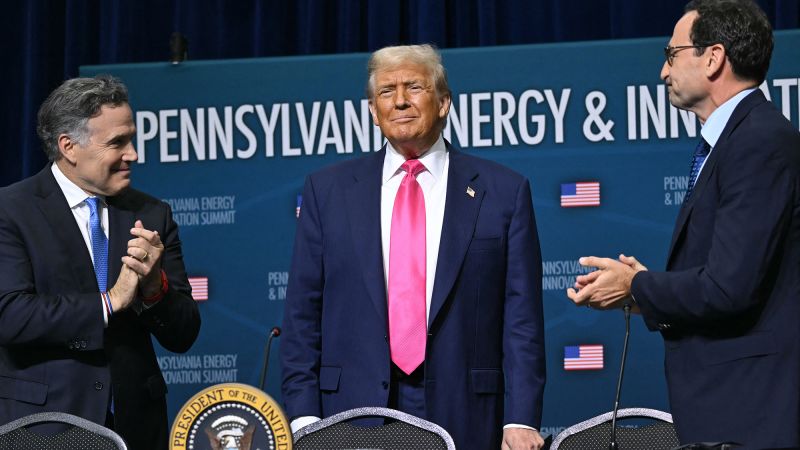On a significant Tuesday, President Donald Trump unveiled a substantial initiative aimed at enhancing Pennsylvania’s status as a leader in artificial intelligence (AI). During the Pennsylvania Energy and Innovation Summit held in Pittsburgh, it was announced that over $90 billion in investments from a range of private sectors, including technology, energy, and finance, will be funneled into this endeavor. This substantial funding is anticipated to revolutionize various sectors, spanning from the economy to healthcare and education.
The announcement underscores a strategic commitment from the Trump administration to ensure the United States retains its competitive edge over China in the rapidly evolving field of AI. The summit, hosted by Pennsylvania Senator Dave McCormick, highlighted the significance of securing adequate energy resources to support the burgeoning AI technology. Emphasizing this need, Trump articulated the vision of producing as much as possible within American borders at every stage of a product’s lifecycle.
During his remarks at the summit, Trump expressed optimism for the future of American workers and industries. He stated, “With that historic announcement and the new commitments being made today, we’re building a future where American workers will forge the steel, produce the energy, build the factories and really run a country like, I believe, like this country has never been run before.” This vision aligns with his broader economic strategy of emphasizing domestic production while bolstering job creation in the USA.
A consortium of high-profile corporations is participating in this investment push. Notable names such as Anthropic, Blackstone, Brookfield, CoreWeave, Google, Constellation Energy, and Meta are involved, signaling a robust cross-industry collaboration. This initiative comes as China accelerates its efforts in energy production, particularly highlighting advancements in renewable resources and coal.
This call to action arrives amid growing concerns regarding the increasing energy requirements necessary to support sophisticated AI applications. According to a report by the International Energy Agency published in April, electricity demand from global data centers is projected to double by 2030, reaching around 945 terawatt-hours. This demand estimate equals the total electricity consumption of Japan, indicative of the scale at which energy resources must expand to meet the needs of next-generation technology.
In this context, energy provider Dominion Energy has revised its upcoming decade’s power projections due to the soaring demand stemming from data centers. Significant investments outlined by major corporations highlight this urgency; for example, Blackstone is investing $25 billion in energy infrastructure specifically within northeast Pennsylvania, while tech giant Google has partnered with Brookfield in a 20-year agreement to develop hydropower facilities.
Moreover, other contributions reflect a commitment to fostering local talent and research. Meta has allocated $2.5 million toward a partnership with Carnegie Mellon University, supporting startups in rural Pennsylvania. Additionally, Anthropic is investing $1 million over the next three years into a cybersecurity education initiative for middle and high school students, along with another million for energy research at Carnegie Mellon.
During the summit, industry leaders voiced strong apprehensions about falling behind in the AI race. Dario Amodei, CEO of Anthropic, underscored the potential ramifications of a comparative disadvantage in AI, noting its implications for national security and employment. He emphasized the critical importance of controlling the entire supply chain, particularly concerning energy and server infrastructure.
Trump, who has made AI investments and technological advancements a central theme of his presidency, reiterated his agenda to enhance American capabilities within this domain. This aligns with broader strategies initiated since the outset of his term, including the declaration of a national energy emergency and the announcement of the ambitious $500 billion AI infrastructure project dubbed Stargate involving prominent tech leaders such as OpenAI’s Sam Altman.
In conclusion, Trump’s commitment articulated during the Pennsylvania Energy and Innovation Summit positions the United States in a proactive stance in the global AI landscape. The collaborative efforts among private sectors, bolstered by substantial investments, signify a concerted strategy to maintain and enhance America’s competitiveness against global rivals, particularly China. As President Trump stated with conviction, “We’re here today because we believe that America’s destiny is to dominate every industry and be the first in every technology, and that includes being the world’s number one superpower in artificial intelligence.”











